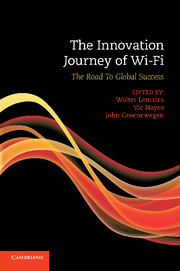Book contents
- Frontmatter
- Contents
- Figures
- Tables
- Contributors
- Preface
- Introduction
- 1 The case and the theoretical framework
- Part 1 The Wi-Fi Journey
- Part 2 The Wi-Fi Journey in Perspective
- 7 Wi-Fi in developing countries: catalyst for network extension and telecom reform
- 8 The Dutch connection to US-based NCR, AT&T, Lucent Technologies and Agere Systems
- 9 Wi-Fi as community-based innovation
- 10 The governance of radio spectrum: licence-exempt devices
- 11 Exploring the future of Wi-Fi
- 12 Reflections and implications for policy and strategy formation
- Part 3 Annexes
- Index
- References
10 - The governance of radio spectrum: licence-exempt devices
Published online by Cambridge University Press: 05 June 2012
- Frontmatter
- Contents
- Figures
- Tables
- Contributors
- Preface
- Introduction
- 1 The case and the theoretical framework
- Part 1 The Wi-Fi Journey
- Part 2 The Wi-Fi Journey in Perspective
- 7 Wi-Fi in developing countries: catalyst for network extension and telecom reform
- 8 The Dutch connection to US-based NCR, AT&T, Lucent Technologies and Agere Systems
- 9 Wi-Fi as community-based innovation
- 10 The governance of radio spectrum: licence-exempt devices
- 11 Exploring the future of Wi-Fi
- 12 Reflections and implications for policy and strategy formation
- Part 3 Annexes
- Index
- References
Summary
Introduction
From the innovation journey of Wi-Fi, to the extent that it has been unfolded, we may conclude that Wi-Fi has become a prime example of a global success story in the shared use of radio frequency spectrum. This success is special, as the common use of a natural resource is often associated with the phenomenon of the ‘tragedy of the commons’, when the appropriation of a resource exceeds its ability to be provisioned or replenished. This is typically the case if access to the resource is unrestricted or open. The success of Wi-Fi stems from the fact that access to the resource (the propagation of electromagnetic waves in free space) is open, but highly regulated. In the regulation of access, use is made of a combination of technological and institutional arrangements, the origins of which can be traced back to the early days of radio; this includes regulation of the power level, the use of protocols, the modulation technique and the definition of the rights to use the RF spectrum.
What distinguishes success from failure is also strongly linked to the way the resource is exploited – i.e. the business model deployed by the entrepreneurs involved and, in particular, the magnitude of the investments incurred and the time required for these investments to be recovered. Here, for instance, lies an important difference between two principal forms of wireless access – unlicensed and licensed – of which Wi-Fi and cellular, respectively, are the prime examples.
Information
- Type
- Chapter
- Information
- The Innovation Journey of Wi-FiThe Road to Global Success, pp. 288 - 330Publisher: Cambridge University PressPrint publication year: 2010
References
Accessibility standard: Unknown
Why this information is here
This section outlines the accessibility features of this content - including support for screen readers, full keyboard navigation and high-contrast display options. This may not be relevant for you.Accessibility Information
- 2
- Cited by
